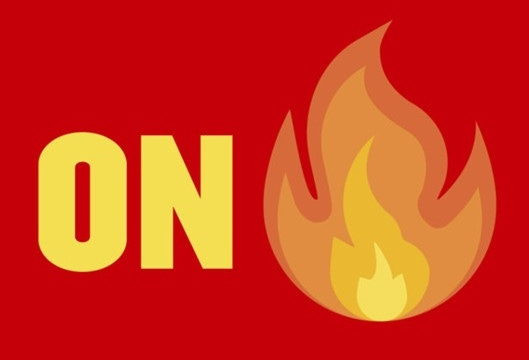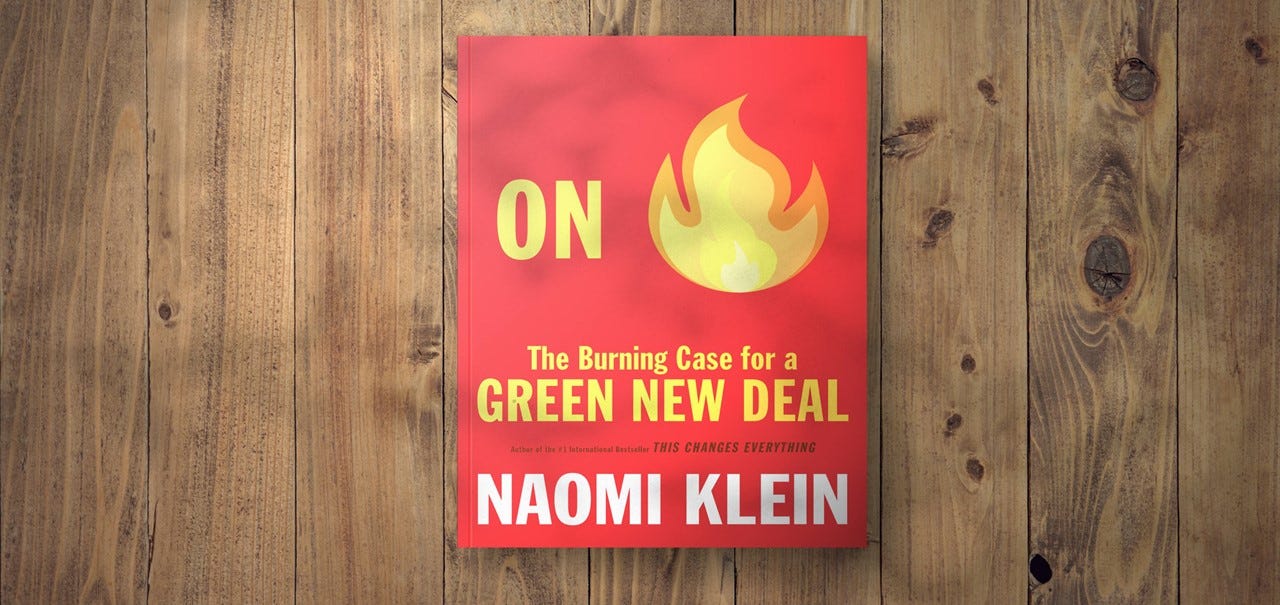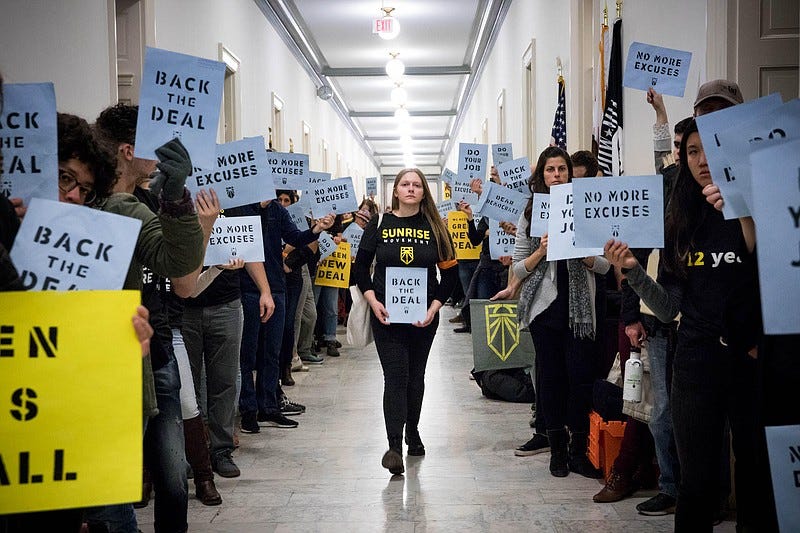Energy policy as if our house was on fire
The conditions of possibility for urgent energy policy in times of crisis
“I don’t want your hope…I want you to panic. I want you to feel the fear I feel every day. I want you to act. I want you to act as you would in a crisis. I want you to act as if the house is on fire, because it is.” (Greta Thunberg, in Naomi Klein, On Fire)

Let’s dwell on this notion of crisis. We know that we are in a climate crisis, but so far we have not been able to really translate that into concerted action. We don’t feel like we are in a crisis, as a society, because, still, time is too long and space is too large, and, as ClimateAdam explains midway through this video, the delay between cause (action) and effect (warming) is too great, the relation too diffuse.
This is the cognitive dissonance that Klein wants to undo in her book, by shaking our knowledge and feeling into alignment. Because, seen from a time-scale only marginally larger than the corona outbreak, we are in crisis. We therefore need (among other things) urgent energy policy that will treat climate change as such.

Urgent energy policy would mean, at least:
hit the fossil fuel industry where it hurts and wind it down in a socially and ecologically responsible manner;
a massive roll-out of existing, proven technologies and recipes: energy efficiency for buildings, electrified public transit, solar and wind for most places (while changing utilities’ regulation as needed to accommodate and accelerate them);
in the meantime, scale up investments in R&D for the technologies we’ll need when the roll-out hits its limits. (This includes smart energy, which, I would contend, is not one of those roll-out technologies, with only a tiny track record of actually improving sustainability).
Now we are in a health crisis – real and perceived – which is leading us into an economic crisis. Accordingly, governments and their peoples are taking crisis measures. Many have pointed out the irony that everything that was deemed impossible and “unrealistic” before turns out suddenly to be possible. But let’s say that a little psychology and a lot of political economy can go a long way to explain that difference. The real question is: can this sudden destabilization become a turning point? Will it change our perception of what is possible to do to tackle climate change?
The idea that this could be a turning point has been put forward by many. Even Yuval Noah “The Long Haul” Harari thinks the future will be made over the next few months. It is also, more pertinently, the premise of Klein’s earlier book, The Shock Doctrine. The book tracks how in various countries, crises of various kinds have been used to implement unpopular economic measures (to ‘free’ this or that market). Things can be remade in times of crisis.
To draw it back into the field on energy,
working at home might make us reconsider our working hours (reducing which will help us bring down emissions);
the quarantine might have broken the halo of ‘free’ privatized mobility that gets us stuck in traffic every day (a regulation of which could make it possible to prioritize public transit);
the idea of videoconferencing instead of conferencing might actually take hold now as it becomes a new normal.
Of potentially even greater significance would be the case to help out neither the fossil fuel companies, nor the airlines or any of the polluting sectors, but to buy them up if their market value evaporates or if they fall.
Reading the temperature
Can these things happen? Well, so far, the stimulus packages in the US aren’t encouraging (even if Democrats were able to make sure they come with more strings than the carry-on-as-usual bailouts of 2008), but other countries have agreed to more progressive measures. Let’s see. On Fire is important in this regard, because it is very clear about how the transition towards sustainability will not be televised, so to speak, without political struggle. Clean energy is not a technical question. Without engagement with the political process by citizens and activists, incumbents will likely prop up the current system – or worse, as she warns in her recent intervention.
In it, she highlights - echoing the tried and true strategy of the neoliberal right - the importance of having the ideas ready for the moment you can argue that their time has come. Right now, we have a collection of ‘pretty good’ ideas about how to organize equitable and sustainable economies. They are still marginal though. The people who argue their time has come are not in the rooms where it happens, and too few of them are banging on the doors.
Yet, times are changing, things are moving and doors are a-banging. The meteoric rise of the Green New Deal in the US is testament to that.

Spreading ideas
Early indications suggest that Covid-19 is not enough to accelerate such changes, even as it shows the influence of the pretty good ideas. But at the very least we should make sure we are ready for the next round:
We need to keep working on the ideas and sharing them as widely as possible, shifting that Overton window and building a constituency.
In particular, we need to reach across the boundaries of our topical or sectoral interests, to do to the difficult but ultimately rewarding work of building intersectional alliances: linking housing to work, discrimination to the environment. Such alliances may be better positioned to move the needle. Next week, I’ll interview a scholar who’ll have more to say about that. (If anybody knows examples of such coalition-building in their countries, let me know!)
So… I announced that these reports on the proposals for a GND would look more like notes and queries. My private notes and queries are all over the place, but I’ve tried to widdle them down and make them look at least somewhat coherent. I apologize if that’s not the impression you got.
For what follows, I’ll probably be working at two speeds. I’ll be getting back to some of the type of content you are used to – the reviews of the literature and interviews with researchers and practitioners. But I’ll also keep reporting on my quest for the big Why’s and How’s of sustainable energy transitions as well.Till then, stay safe,
Marten
Pushback
Last issue, I highlighted Aranoff et al’s point that we should go fast rolling out the popular rooftop PV, and go slow building out the contentious wind turbines. One of you responded by saying such advice sounded pretty irresponsible, given that wind will be our most potent sources of renewable energy. Indeed, I had questioned the math of the proposal in an earlier version of the newsletter, but in order to save you a few seconds I shaved off the remark in the end. (And now look at me.)
Still, the point is generally valid. Let me explain. Here’s where Aranoff et al come from:
“shoving clean energy infrastructure down people’s throats is a sure recipe for making them hate the Green New Deal”.
Unfortunately, wind turbines have gotten a bad rep. For a very long time, probably still now, developers and planners seemed to not have gotten that memo and proceeded with their plans without seriously taking into account and talking to people from the area. That either got them a ban if those people were powerful enough, or just a lot of bad blood if they weren’t. Building out wind parks regardless of social impact will hurt the politics of sustainability and will create geographic inequality, with the most marginal stuck with infrastructure the rest of us don’t want. The good news: taking people’s interests seriously does not mean going slow per se. Working out mutually beneficial arrangements is not as difficult as long as you’re willing (or prescribed by law) to give a little. Moreover, replicating these arrangements will ultimately speed up development.
I hope to back up this claim by science in future issues 😉.
